Loe raamatut: «The Mirror of Literature, Amusement, and Instruction. Volume 13, No. 372, May 30, 1829», lehekülg 7
Retrospective Gleanings
CHILTERN HUNDREDS
The three Hundreds of Desborough, Stoke, and Burnham, in Bucks, are called the "Chiltern Hundreds," and take their name from the Chalk Hills which run through Bucks and the neighbouring counties. The property of these Hundreds remaining in the Crown, a Steward is appointed at a salary of 20s. and all fees, which nominal office is accepted by any Member of Parliament who wishes to vacate his seat.
PEG TANKARDS
At Braintree and Booking, in Essex, when topers partake of a pot of ale, it is divided into three parts or draughts, the first of which is called neckum, the second sinkum, and the third swankum. In Bailey's Dictionary, swank is said to be "that remainder of liquor at the bottom of a tankard, pot, or cup, which is just sufficient for one draught, which it is not accounted good manners to divide with the left-hand man, and according to the quantity is called either a large or little swank."
CHIMNEYS
Has the precise period been ascertained when chimneys upon the present mode were first constructed in England? It was apparently not sooner than Henry the Eighth's time; for Leland, when he visited Bolton Castle, in Yorkshire, seems to have been greatly surprised by the novelty and ingenuity of the contrivance. "One thing (says he) I much notyd in the haull of Bolton, how chimneys was conveyed by tunnills made in the sydds of the waulls, betwixt the lights; and by this meanes is the smoke of the harthe wonder strangely convayed."
The front of St. John's Hospital at Lichfield, presents one of the most curious ancient specimens extant of this part of our early domestic architecture. This building was erected 1495, but it is possible that the remarkable chimneys may have been subsequently added.
OLD LONDON
(For the Mirror.)
In a collection of Epigrams written by Thomas Freeman, of Gloucestershire, and published in 1014, is the following, entitled "London's Progresse:"—
"Why, how nowe, Babell, whither wilt thou build?
I see old Holbourne, Charing Crosse, the Strand,
Are going to St. Giles's in-the-field,
Saint Katerne, she takes Wapping by the hand,
"And Hogsdon will to Hygate ere't be long,
London has got a great way from the streame,
I thinke she means to go to Islington,
To eate a dish of strawberries and creame.
The City's sure in progresse I surmise,
Or going to revell it in some disorder,
Without the Walls, without the Liberties,
Where she neede feare nor Mayor nor Recorder.
Well! say she do, 'twere pretty, yet 'tis pitty
A Middlesex Bailiff should arrest the Citty."
W.C.R.R.
AVVER
(For the Mirror.)
The word "Avver" has doubtless the same origin as the German word "Hafer" "Haber" which signifies in English, oat.
In some parts of Germany a pap of oatmeal "Haferbrei" is very common as breakfast of the lower classes. Of "Haferbrod" oatbread, I only heard in 1816, when the other sorts of grain were so very scarce in Germany.
A German and Constant Reader of the Mirror.
THE HALCYON
(For the Mirror.)
So often alluded to by the poets, is the bird called the King Fisher. It was believed by the ancients that while the female brooded over the eggs, the sea and weather remained calm and unruffled; hence arose the expression of Halcyon days.
R.N.
SIR ISAAC NEWTON
(For the Mirror.)
Woolsthorp, Lincolnshire, a little village on the great north road between Stamford and Grantham, is memorable as the birthplace of that illustrious philosopher, Sir Isaac Newton. The house in which he was born, is a kind of farmhouse, built of stone, and is, or was lately standing. The learned Dr. Stukely visited it in 1721, and was showed the inside of it by the country people; in a letter to Dr. Mead on this occasion, he says, "They led me up stairs, and showed me Sir Isaac's study, where I suppose he studied when in the country, in his younger days, as perhaps, when he visited his mother from the university. I observed the shelves were of his own making, being pieces of deal boxes, which probably he sent his books and clothes down in upon these occasions."
Halbert H.
The Gatherer
"A snapper-up of unconsidered trifles."
SHAKSPEARE.
When Dr. Johnson courted Mrs. Porter, whom he afterwards married, he told her "that he was of mean extraction, that he had no money; and that he had an uncle hanged!" The lady by way of reducing herself, to an equality with the doctor, replied, "that she had no more money than himself; and that, though she had not a relation hanged, she had fifty who deserved hanging." And thus was accomplished this very curious amour.
W.G.C.
On the Dorchester road from Sturminster, is a public-house called the "King's Stag," its sign displays a stag with a gold collar around its neck, and underneath are the following lines:—
When Julius Caesar landed here,
I was then a little deer;
When Julius Caesar reigned king,
Round my neck he put this ring;
Whoever shall me overtake,
Spare my life for Caesar's sake.
Ruris.
When Lord Norbury was applied to by a collector of one of the local taxes for the amount of tax, his lordship said, he had already paid it, and on looking to his file, discovered a receipt, signed by the same collector who then applied for it. The tax-man, confounded, apologized in the best manner he could, stating his regret that he did not recollect it. "I dare say," said my lord, "you are very sorry you did not re-collect it."
IN KENSINGTON CHURCHYARD
"Here are deposited the remains of Mrs. Ann Floyer, the beloved wife of Mr. Richard Floyer, of Thistle Grove, in this parish, died on Thursday the 8th of May, 1823.
"God hath chosen her as a pattern for the other Angels."
IN DUNDEE CHURCHYARD
"Here lies the body of John Watson,
Read not this with your hats on,
For why? He was the Provost of Dundee,
Hallelujah, hallelugee."
NEW MEASURE
Shortly after the introduction of the New Weights and Measures, an innkeeper in a market-town, not far from Sudbury, in Suffolk, sent his ostler to a customer with a quantity of liquor, which he delivered with the following words:—"Marstur bid me tell ye Sar, as how 'tis the New Infarnal Measure."
A farmer calling upon his landlord to pay his rent, apologized for being late, by saying that his illness prevented his attending earlier, and he did not know what his disorder was. The gentleman told him it was "Influenza." Returning home he was met by the schoolmaster of the village, who inquired after his health, "I am very poorly," replied the farmer, "my landlord tells me my complaint is Humphry Windsor."
A witness on a trial being interrogated by Judge Willis, in a manner not pleasing to him, turned to an acquaintance, and told him in a half whisper, "he did not come there to be queered by the old one." Willis heard him, and instantly replied, in his own cant, "I am old 'tis true—and I'm rum sometimes—and for once I'll be queer—and I send you to quod."
H.B.A.
An exciseman whose remarks and answers were frequently rather odd, riding at a quick pace upon a blind pony, was met by a person who praised the animal much, "Yes," replied the officer, "he is a very good one, only he shies at every thing he sees."
SIR WALTER SCOTT'S NEW NOVEL
A supplement published with the present Number, contains an outline of of the Novel of Anne of Geierstein, OR THE MAID OF THE MIST; With Unique Extracts, &c.
LIMBIRD'S EDITION OF THE
Following Novels is already Published:





















